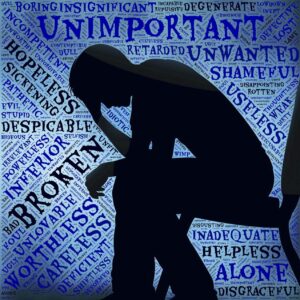HOW TO FORGIVE YOURSELF
Forgiving yourself is one of the toughest things a person can go through; especially when you are at fault, it is not so easy to excuse yourself. No matter the reason, focusing on self-awareness can help you fix the pains of the past. As you heal, you’ll start to understand that life is a journey filled with challenges that can’t be avoided.
Why Should You Forgive Yourself
You are important as any other living being and you deserve to have a happy and content life. Forgive yourself as you forgive your loved ones. It plays a fundamental part in your emotional well-being and personal growth. It is common to feel anger, guilt, and shame when you are at fault and it may seem to be impossible to overcome these emotions which leads to depression, anxiety, and low self-esteem.

It affects not only you but also the people around you and do you think it’s worth suffering for the actions of your past? If so, you are wrong. It is stupid to think that punishing yourself could change anything. Everyone makes mistakes, but learning how to learn from these faults, letting go, moving on, and forgiving yourself is a part life.
We are humans and that’s how we live and survive.
Process Of Forgiving Yourself
1. Acknowledging Mistakes: Accepting our mistakes takes a lot of courage. It is necessary to acknowledge your wrongdoings and overcome the guilt and hatred you feel for yourself over time. Comfort your actions with honesty and recognize the impact they had on you and others. There is no human out there who’s born perfect. People make themselves perfect.
2. Letting Go Of Guilt And Shame: Our past is filled with many mistakes from small to big but holding those emotions will only burden your present which is not worth wasting for something that cannot be reversed. Maturity is letting go of the guilt and shame you felt for yourself and understanding that no one is perfect and everyone makes mistakes.
3. Accepting Imperfection: Here comes the bigger step, which is accepting that your imperfect loud and clear. This is a crucial step towards imperfections as here you will grow to understand that nobody is perfect and by accepting or recognizing your mistakes it means committing errors is a part of human nature. Humans are worthy of forgiveness.
4. Reflecting On The Past: Reflecting on our past helps us to grow. Reflecting on your past actions and their consequences makes you think of why did you do what you did at that moment. This helps you to learn from your past mistakes to avoid repeating those mistakes.
5. Taking Responsibility: Taking responsibility is a huge step where you step up for the mistakes and consequences that arise instead of playing the blame game or seeking an excuse. It helps you grow mentally strong and confident in yourself.
6. Making Amends: Setting things right is what shows your effort to take responsibility for the action done. It means taking steps like apologizing, compensating, or changing your behavior for good. These actions strengthen not only yourself but also help to sustain the bonds from breaking up.
Practicing Self Compassion
Being Kind To Oneself: Self-compassion involves treating ourselves with love and kindness; the same as we treat our loved ones in need. That means taking time to nurture yourself with kind and supportive words building confidence and developing empathy towards oneself, especially during difficult times.
Treating Oneself With Empathy: Empathy toward oneself is acknowledging our pain and suffering without any kind of judgment. This perceives that we deserve compassion, love, kindness, and forgiveness too.
Challenges in self-forgiveness
- Overcoming Negative Self-Talk: Negative self-talk can hinder your progress in forgiving yourself by rebuilding the emotions of shame and guilt and this takes you nowhere. Self-awareness and self-compassion are the keys to overcoming negative self-talk and seeing the brighter side of things.
- Dealing With Lingering Emotions: Even after forgiving yourself, some emotions like sadness, guilt, and regret may persist. Accept and feel those emotions without any judgment and these feelings will eventually pass.
- Facing Societal Expectations: Societal standards and norms are mostly judgmental and make you a victim as long as you fear others’ opinions of you. You can overcome this only when you start to prioritize yourself and your well-being above all instead of seeking external validation.
Benefits In Self Forgiveness
- Mental Well-Being: Self-forgiveness is closely linked to your mental health if you are burdened by shame, guilt, regret, and self-loathing, this will affect your mental well-being. So if you can overcome this negative emotion it’ll help you be at peace and have emotional resilience.
- Improved Relationships: Forgiving ourselves improves our relationship with others. After being out of the phase of self-loathing and self-torment letting those emotions ease you up and lets you be free with your feelings.
- Personal Growth And Resilience: By forgiving yourself you will be able to focus on your personal growth without being tormented by the consequences of actions. Personal growth and resilience empower us to learn from our mistakes and move forward with greater self-awareness and confidence.

Tips To Cultivate Self Forgiveness
- Practicing Mindfulness: Self-awareness can help us be more mindful and observant of the things happening within ourselves. It helps to observe our thoughts emotions and behavior without being judgmental and cultivate self-compassion.
- Seeking Support From Others: It is okay to seek help when necessary. Seeking support from friends, family, or a therapist can provide valuable guidance and encouragement on the journey towards self-forgiveness.
- Engaging In Self-Care Activities: Taking care of yourself by nurturing your body, mind, and soul can help you cultivate self-compassion and also guide you in taking more control of your mind to keep it stable in handling difficult or similar situations.
Way Forward
Forgiving yourself is a transformative process and takes a lot of courage, honesty and determination to accept yourself completely and forgive yourself. But at the end of the day, it’s all about you and your emotions and what you learned and you being ready to grow yourself both mentally and physically.

